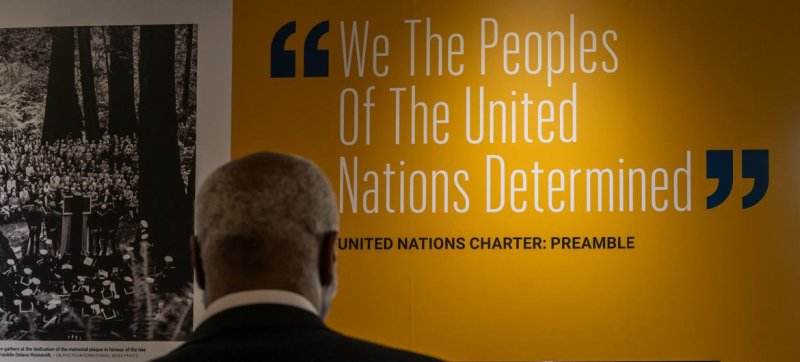- Fakhrul condemns attacks on media, calls for unity, justice |
- 2 cops among 4 hurt in clash outside Indian Assit H.C. in Ctg |
- Inqilab Moncho urges people to avoid violence |
- Hadi’s death: Prothom Alo, Daily Star offices set afire |
- সন্ধ্যায় পৌঁছাবে হাদির মরদেহ, জানাজা শনিবার |
UN Charter at 80: Reflections, Resolve — and a Symbolic Run

The preambular words of the UN Charter displayed at the United Nations Headquarters, in New York.
It wasn’t an average Thursday morning in Manhattan. In the early hours, UN diplomats — joined by UN staff — laced up their sneakers and hit the streets, running from Times Square to the East River along a route that traced the shape of “UN@80.”
Under cooler skies following days of intense heat, the symbolic run ended where it all began: at the original UN Charter — the document that launched the Organization and reshaped the modern international order — now on display at UN Headquarters.
Inside the General Assembly Hall, delegates gathered to commemorate the 80th anniversary of the Charter’s signing. They reflected on the eight decades in which the UN helped rebuild nations after World War II, supported decolonisation, fostered peace, delivered humanitarian aid, advanced human rights and development, and addressed emerging threats like climate change.
General Assembly President Philémon Yang described the occasion as “symbolic” yet somber, given the ongoing conflicts in Gaza, Ukraine, and Sudan, as well as growing challenges to multilateralism.
He urged nations to choose diplomacy over force and uphold the Charter’s vision of peace and human dignity:
“We must seize the moment and choose dialogue and diplomacy instead of destructive wars.”
Secretary-General António Guterres echoed this call, warning that the Charter’s principles are under threat and must be defended.
“The Charter of the United Nations is not optional. It is not an à la carte menu. It is the bedrock of international relations,” he said, urging renewed commitment to its promises “for peace, for justice, for progress, for we the peoples.”
Security Council President for June, Carolyn Rodrigues-Birkett, emphasised the urgency of collective action:
“Let this 80th anniversary of the Charter be not just an occasion for reflection, but also a call to action.”
Eighty years ago, on 26 June 1945, delegates from 50 nations gathered in San Francisco to sign a document that would change history. Forged in the aftermath of WWII, shaped by lessons from the Great Depression, the Holocaust, and the collapse of the League of Nations, the UN Charter marked a new global commitment.
Its preamble — “We the peoples of the United Nations” — expressed a determination to prevent future conflict, affirm human rights, and promote peace and progress.
That very document, preserved by the US National Archives, has now returned to UN Headquarters for public display through September — a powerful symbol of past promise and present commitment to multilateralism.
More voices joined the commemoration. Bob Rae, President of ECOSOC, reminded attendees of the UN’s relative youth in the context of human history.
“We can clearly assess what we’ve achieved, while recognising both our successes and failures,” he said, holding up a copy of the Charter once used by his father.
“The UN is not a government, and the Charter is not perfect — but it was founded with great hope.”
Judge Yuji Iwasawa, President of the International Court of Justice, acknowledged progress since 1945 while underscoring ongoing challenges.
“The drafters’ vision to uphold the rule of law for international peace and security remains not only relevant but indispensable today.”
In a moment bridging generations, young poet Jordan Sanchez took the stage to deliver her piece Let the Light Fall. Her words evoked hope, justice, and shared humanity:
“Let the light fall on fallen faces... There is no fear, only abundance — of safety, of knowing there will always be enough light.”
She closed with a call to courage and imagination:
“Let us be bold enough to look down and take it, humble enough to kneel and bathe in it, and childish enough to truly believe in it.”
The Charter’s commitment to gender equality was hard-won. In 1945, only four women were among the 850 delegates at San Francisco, and just 30 of the represented countries had granted women the right to vote.
A 2018 podcast revisited these overlooked pioneers and questioned why their contributions are often missing from the UN’s founding narrative.

